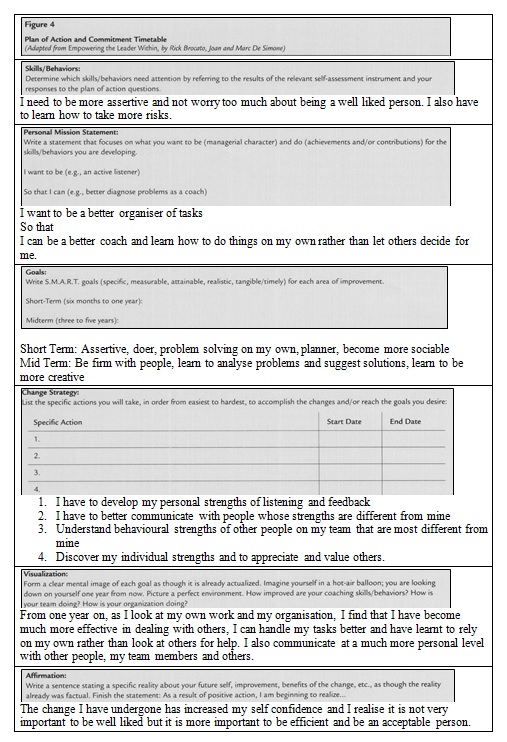Introduction
The paper performs a DiSC test and provides a plan of action and commitment timetable. The test stands for Dominance, Influence, Steadiness, and Compliance. This is a standard self-administered test and is used for the evaluation of prospective employees (DiSC, 2008).
Test Score
Test results of the scores are:
- Dominance 20: The interpretation of the score is “People who score in the low range: tend to want peace and harmony; prefer to let others initiate action and resolve problems; are quiet and indirect in their approach to most situations and are usually cautious and calculate risks carefully before acting. They are generally well-liked because of their mild and gentle nature. Other people will tend to see them as being patient, calm, thoughtful and a good listener” (DiSC, 2008).
- Influence 48: The interpretation of the score is “People who score in the average range are likely to possess and display a mixture of the traits and behaviors associated with both high range and low range scores. A well-balanced mix of the best of both ranges. People who score in this range are unlikely to be ‘extreme’ types” (DiSC, 2008).
- Steadiness 16: The interpretation of the score is “People who score in the low range: tend to enjoy change and variety in their work and non-work life; are expansive by nature and tend not to like routine and repetitive work/activities. They enjoy stretching themselves intellectually and physically” (DiSC, 2008).
- Compliance 16: Interpretation of the score is “People who score in the low range: are independent and uninhibited; resent rules and restrictions; prefer to be measured by results and are always willing to try the untried. Free in thought, word, and deed, they long for freedom and go to great lengths to achieve it. They feel that repetitive detail and routine work are best ‘delegated’ (Guide, 2007).
Strengths and capacities about coaching
I have a low level of dominance and have an attitude that is being patient, calm, thoughtful, and a good listener. I feel these traits are very important for coaching, as we need to be patient with students and must be liked by them to get their confidence. My Compliance score is 16 and this means that I preferred to be measured by results and am always willing to try new things and this is important in coaching (Sparrow, 2006).
- What aspects of the report seem to describe you well?: The traits of peace and harmony, cautious, and calculate risks carefully before acting best describe me.
- What aspects of the report do not seem to describe you well? The score says that I resent rules and restrictions and this is not always true as I respect and obey the rules and restrictions that are to be obeyed.
- How does this information relate to other self-assessments that you might have taken in the past? The results match in some areas and in some areas they are off. In one of the previous tests it was suggested that I like routine and repetitive jobs but this time it is different and correct.
Plan of Action and Commitment Timetable
My Plan of action and commitment timetable is as given in the following table (Brocato, 2003)

References
Brocato, R. (2003). Coaching for improvement: An essential role for team leaders and managers. The Journal for Quality and Participation, 26 (1), 17-22.
DiSC. 2008. The Ubiquitous DISC. Web.
Guide to Managing Human Resources, Chapter 5: New Employee Orientation, Web.
Sparrow, S. (2006). Do you want to be in L&D? Training & Coaching Today, p. 31.